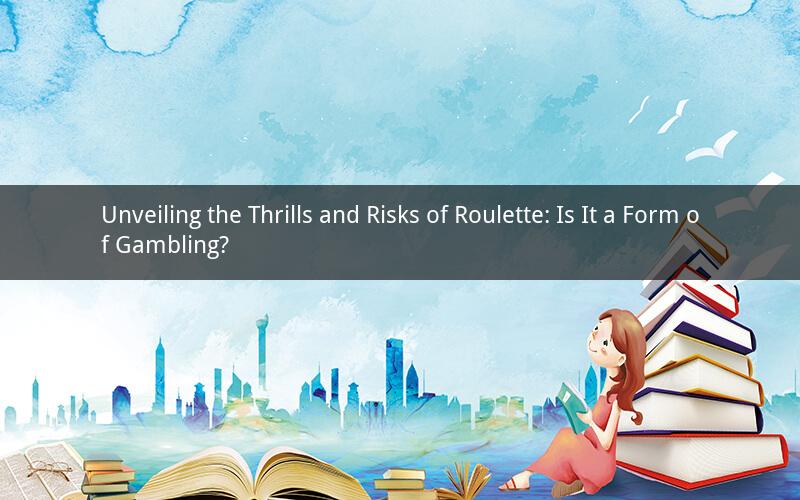
Roulette, a game of chance that has been captivating players for centuries, has always been a subject of debate. Is it merely a form of entertainment or a gateway to gambling addiction? In this article, we will delve into the world of roulette and explore the various aspects that make it a thrilling yet controversial game.
1. The History of Roulette
Roulette originated in 17th-century France and has since become a popular game in casinos worldwide. The name "roulette" is derived from the French word "rouler," which means "to roll." The game involves spinning a wheel divided into numbered sections and a ball that is dropped into the wheel. Players bet on where the ball will land, and the odds are based on the number of pockets on the wheel.
2. The Different Variants of Roulette
There are several variations of roulette, including American, European, and French roulette. Each variant has its own set of rules and odds, which can affect the player's chances of winning.
a. American Roulette
American roulette has 38 pockets, including a double zero (00) and a single zero (0). This gives the house an edge of 5.26%, making it the least favorable variant for players.
b. European Roulette
European roulette has 37 pockets, including a single zero (0). This reduces the house edge to 2.70%, making it the more favorable variant for players.
c. French Roulette
French roulette is similar to European roulette but includes additional rules, such as "la partage" and "en prison," which can further reduce the house edge.
3. The Thrill of Playing Roulette
One of the reasons why roulette is so popular is its simplicity and the thrill of the game. Players can place bets on a single number, a range of numbers, odd or even, or red or black. The excitement of watching the ball spin and land on a winning number is hard to match.
4. The Risks of Roulette
While roulette can be thrilling, it also carries significant risks. The odds are heavily stacked against players, and the house edge makes it difficult to consistently win. Additionally, the fast-paced nature of the game can lead to impulsive decisions and potentially dangerous gambling habits.
5. Is Roulette a Form of Gambling?
The question of whether roulette is a form of gambling is a matter of perspective. On one hand, roulette is a game of chance that requires players to make bets. On the other hand, it is a form of entertainment that can be enjoyed by players of all ages.
6. How to Play Roulette Responsibly
If you choose to play roulette, it is essential to do so responsibly. Here are some tips to keep in mind:
a. Set a budget: Decide how much money you are willing to spend on roulette and stick to it.
b. Avoid chasing losses: Don't try to recoup your losses by betting more money.
c. Take breaks: Step away from the table if you feel like you are losing control of your emotions.
d. Stay informed: Familiarize yourself with the rules and odds of the game.
7. Conclusion
Roulette is a thrilling and captivating game that has been enjoyed by millions of players over the centuries. While it is a form of gambling with significant risks, players can minimize these risks by playing responsibly. Whether you are a seasoned gambler or a casual player, roulette offers a unique experience that is sure to keep you on the edge of your seat.
Questions and Answers:
1. What is the main difference between American and European roulette?
- The main difference is the number of pockets on the wheel. American roulette has 38 pockets (00 and 0), while European roulette has 37 pockets (0 only).
2. What is the house edge in European roulette?
- The house edge in European roulette is 2.70%.
3. What are the "la partage" and "en prison" rules in French roulette?
- "La partage" is a rule that allows players to win half their bet if the ball lands on zero. "En prison" is a rule that allows players to leave their bet on the table for the next spin if the ball lands on zero.
4. How can players minimize their risks when playing roulette?
- Players can minimize their risks by setting a budget, avoiding chasing losses, taking breaks, and staying informed about the rules and odds of the game.
5. Is it possible to make a living playing roulette?
- While it is possible for some players to make a living playing roulette, it is highly unlikely. The odds are heavily stacked against players, and the house edge makes it difficult to consistently win.